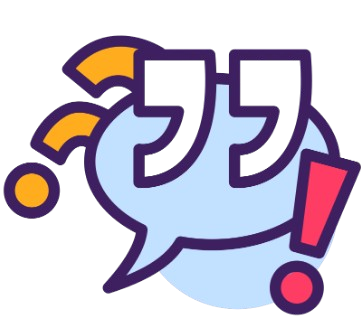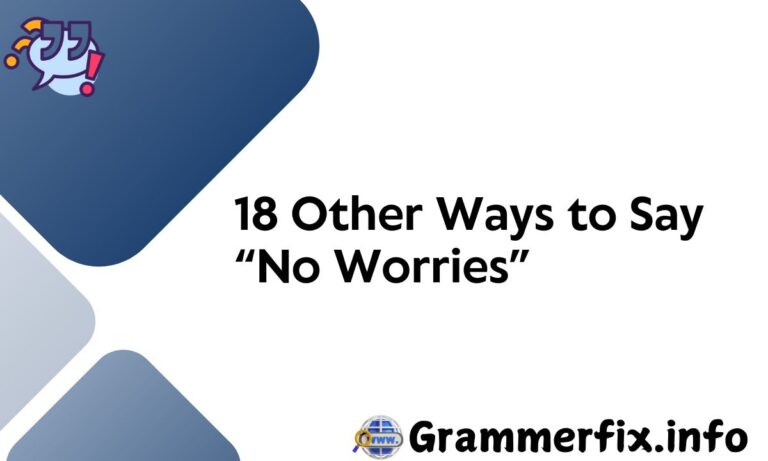When you want to express reassurance or let someone know that something isn’t a problem, “no worries” is a common phrase. But there are plenty of other ways to say it too. Phrases like “it’s all good,” “don’t worry about it,” or “no problem” are popular alternatives.
You could also say “it’s fine” or “it’s cool” to keep it casual. For more formal contexts, phrases like “not at all” or “you’re welcome” can be used. These alternatives can make your conversation sound more varied and natural.
Key Takeaways
- There are many casual and formal alternatives to express reassurance.
- Phrases like “it’s all good” and “don’t worry about it” are informal and friendly.
- More formal options include “not at all” and “you’re welcome.”
- Using varied expressions can make your speech sound more natural and engaging.
- Context matters—choose the right phrase based on the tone and situation.
- These alternatives help avoid repetition and keep conversations fresh.
1. No Problem
“No problem” is a common way to reassure someone that you’re happy to help, and that they needn’t worry about any inconvenience. It conveys a sense of ease and a lack of burden on the speaker.
Example:
Friend: “Thanks for helping me with the report.”
You: “No problem, happy to assist!”
Letter:
Dear [Name],
Thank you for reaching out! I’m glad I could help you with the task. You don’t need to worry about it at all, as it was no problem for me. If you need anything else in the future, feel free to ask.
Best regards,
[Your Name]
2. It’s All Good
“It’s all good” is an informal phrase used to assure someone that everything is fine or that no harm was done. It’s often used when there’s no issue or when something has been resolved easily.
Example:
You: “Sorry, I was late for the meeting.”
Colleague: “It’s all good, we haven’t started yet.”
Letter:
Dear [Name],
I wanted to let you know that it’s all good regarding the minor issue we faced earlier. No need to worry about it; everything has been sorted. If there’s anything else you’d like assistance with, just let me know!
Kind regards,
[Your Name]
3. Don’t Mention It
This phrase is a polite way to tell someone that they don’t need to thank you or bring it up. It’s a way to downplay your effort, suggesting that helping them was no trouble.
Example:
You: “Thanks for helping me with that presentation!”
You: “Don’t mention it, I’m happy to help!”
Letter:
Dear [Name],
It was no trouble at all assisting you with your request. Don’t mention it—helping you out was truly my pleasure. Let me know if you need further assistance in the future!
Warm regards,
[Your Name]
4. No Sweat
“No sweat” implies that something was easy or not difficult to do. It’s a relaxed way of telling someone that whatever they asked was no challenge for you.
Example:
You: “I appreciate you finishing the task so quickly.”
You: “No sweat, happy to get it done for you!”
Letter:
Dear [Name],
I’m glad I could assist you with that project. No sweat at all—anything you need, I’m always ready to help out. Please don’t hesitate to ask if something else comes up!
Best,
[Your Name]
5. You’re Welcome
“You’re welcome” is a classic response to a thank you. It’s a simple way to acknowledge someone’s gratitude and let them know that you were happy to assist.
Example:
Friend: “Thanks for the advice!”
You: “You’re welcome, anytime!”
Letter:
Dear [Name],
Thank you for your kind words. You’re welcome! I’m glad I could be of help. If you need anything else, just let me know.
Best regards,
[Your Name]
6. My Pleasure
“My pleasure” is a polite and warm way to acknowledge thanks, often used to convey that helping was genuinely enjoyable for the person who assisted.
Example:
You: “I really appreciate you picking up my package.”
You: “My pleasure, I was happy to do it!”
Letter:
Dear [Name],
It was truly my pleasure to assist you with the task. I’m always here if you need anything else. Please don’t hesitate to reach out again.
Best regards,
[Your Name]
7. Anytime
“Anytime” is an informal way to tell someone they can count on you at any time for help. It suggests that you’re always available to assist when needed.
Example:
Friend: “Thanks for the help with the project!”
You: “Anytime, you know I’m always here.”
Letter:
Dear [Name],
I’m so happy I could help with the task at hand. Anytime you need assistance again, feel free to ask—I’m always here to lend a hand.
Kind regards,
[Your Name]
8. All Good Here
“All good here” is a reassuring phrase often used to indicate that everything is fine from the speaker’s side. It can be a response to an apology or an expression of concern.
Example:
Colleague: “Sorry about the mistake!”
You: “All good here, no worries at all.”
Letter:
Dear [Name],
Thanks for checking in, but all good here. There’s no need to apologize, everything is fine on my end. If you need any further help, just let me know.
Best,
[Your Name]
9. Not a Big Deal
“Not a big deal” is used to let someone know that whatever happened is insignificant or that it was not troublesome. It conveys that you don’t mind at all.
Example:
You: “I’m so sorry for the delay!”
You: “Not a big deal, don’t worry about it!”
Letter:
Dear [Name],
I wanted to reassure you that it’s not a big deal at all. There’s no need for concern. If you need anything else in the future, feel free to reach out.
Warm regards,
[Your Name]
10. Happy to Help
“Happy to help” is a positive, enthusiastic response indicating that you’re glad to offer assistance. It’s often used to show eagerness to support someone.
Example:
You: “Thanks for fixing that issue!”
You: “Happy to help, glad it’s working now!”
Letter:
Dear [Name],
I’m happy to help anytime! Don’t hesitate to reach out if you run into any other issues or need further assistance.
Best regards,
[Your Name]
11. No Trouble
“No trouble” is a relaxed way of saying that something was easy for you to do and that the person you’re speaking to shouldn’t worry about it.
Example:
You: “I appreciate you helping me out!”
You: “No trouble at all, happy to do it!”
Letter:
Dear [Name],
It was no trouble at all helping with your request. If there’s anything else you need assistance with, feel free to ask!
Best regards,
[Your Name]
12. Glad to Assist
“Glad to assist” is a formal and polite way to express that you are happy to offer help or support. It shows a more professional tone.
Example:
You: “Thank you for your support!”
You: “Glad to assist, anytime!”
Letter:
Dear [Name],
I’m glad to assist with any challenges you may have. Please let me know if there’s anything else I can do to help.
Best regards,
[Your Name]
13. Sure Thing
“Sure thing” is an informal and friendly way to indicate agreement or willingness to help. It shows that you’re happy to do whatever is being asked.
Example:
Friend: “Can you help me with this?”
You: “Sure thing, I’ll get it done!”
Letter:
Dear [Name],
Sure thing! I’m happy to assist with any future tasks you have. Just let me know when you need help!
Best,
[Your Name]
14. No Hassle
“No hassle” is a way to express that doing something was easy and straightforward. It’s often used to indicate that no extra effort was required on your part.
Example:
You: “Thanks for taking care of that for me!”
You: “No hassle, it was easy!”
Letter:
Dear [Name],
Don’t worry, it was no hassle at all to help you with that task. If you ever need more assistance, don’t hesitate to reach out.
Best regards,
[Your Name]
15. Just Doing My Job
“Just doing my job” is often used when someone thanks you for fulfilling a professional responsibility. It downplays the effort by indicating that it’s part of your role.
Example:
You: “Thanks for the excellent service!”
You: “Just doing my job, happy to help!”
Letter:
Dear [Name],
Thank you for your appreciation! I’m just doing my job and am happy to be of service. Feel free to reach out if you need further help.
Kind regards,
[Your Name]
16. Don’t Worry About It
“Don’t worry about it” is a reassuring phrase used to let someone know that there’s no need for concern or stress about a situation.
Example:
You: “Sorry for the inconvenience!”
You: “Don’t worry about it, everything’s fine.”
Letter:
Dear [Name],
Don’t worry about it at all—there’s no issue. I’m happy that I could assist. Let me know if you need anything else!
Best,
[Your Name]
17. That’s Perfectly Fine
“That’s perfectly fine” is a polite way of saying that something is acceptable and there’s no issue with it. It can be used to reassure someone after an apology.
Example:
You: “I’m sorry for the mistake!”
You: “That’s perfectly fine, don’t worry about it.”
Letter:
Dear [Name],
That’s perfectly fine! There’s no need to apologize. Everything’s good on my end. Please feel free to reach out if you need anything else.
Best regards,
[Your Name]
18. It’s No Issue
“It’s no issue” is another reassuring phrase indicating that something is not a problem at all. It conveys that whatever has happened is easy to manage.
Example:
You: “I apologize for the confusion.”
You: “It’s no issue at all, everything’s clear now.”
Letter:
Dear [Name],
I just wanted to let you know that it’s no issue whatsoever. Don’t stress over it—I’m happy to help in any way I can.
Best,
[Your Name]
Conclusion
To say “no worries.” You could say, “It’s all good,” “Don’t mention it,” or even “No problem.” These phrases convey the same sentiment and can fit various situations, whether casual or more formal.
In some instances, saying “Anytime!” or “It’s nothing” might be more fitting, especially when you want to convey a sense of ease and availability. If you’re aiming for a more relaxed tone, “Don’t sweat it” or “You’re good” can also be effective. The key is knowing the situation and context to pick the best fit.
Related Post
30 Other Ways to Say “If I Can Be of Further Assistance”
20 Synonyms for “Attention to Detail” on Your Resume
26 Synonyms for “Step Out of Your Comfort Zone”
32 Other Ways to Say “I Will Keep You Posted”
25 Synonyms for “Not Only … But Also”

Atiqa is a talented content writer and digital marketer with expertise in SEO, social media management, and online marketing. She excels at creating impactful, data-driven content to help businesses connect with their target audience and achieve measurable outcomes.

